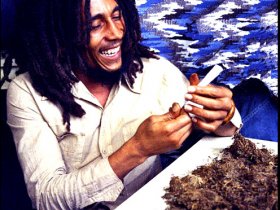The fifth son of the Reggae Legend recently spoke with The Times of India revealing the little known fact that the iconic Rastafarian was a farmer.
"My father used to say that one day he was going to stop playing music and just farm. I am the other side of my father, the completion of his dream to return to farming," says 40-year-old Rohan.
Bob indeed once said in a 1973 interview that "Reggae music takes its groove from the body movements of the working farmer ploughing the earth and chopping the bushes."
Bob Marley's maternal grandfather was not just a prosperous farmer but also a bush doctor adept at the mysticism-steeped herbal healing that guaranteed respect in Jamaica's remote hill country. He is still significant for many indigenous communities. Australian aboriginals burn a sacred flame to honour his memory, members of the Native American Hopi and Havasupai tribes consider him to be the fulfilment of an ancient prophecy, and in Nepal he is considered to be an incarnation of Vishnu.
Now carrying out his father's eco-socialistic nature, Rohan through a sustainable farm, an organic coffee plantation, and running the family's charitable organisation 1Love while promoting his latest venture House of Marley uses natural, earth-friendly and renewable materials to make products and packaging of musical gear, explains that "It's all inspired by my father's vision of one world, one love. The idea of farming was always interesting to me growing up as a child because my father, my mother and my grandmother would always discuss it."
He vividly remembers his grandmother drying their wild coffee berries in the sun, hulling and roasting them for her own cup of coffee each morning. But it was on a vacation years later to Jamaica where Marley came to the realization that farming was ultimately his calling.
"In 1999, a friend of mine introduced me to this land in Jamaica and when I first approached the land I fell in love with the river," he recalls. "Once I purchased the land north of the river, I realized we had all of this land. There were fruits and coffee already growing on the land. So I figured I couldn't let it go to waste. I said to myself I might as well learn the process of growing coffee and get into the full ideology of what farming is all about, but not just farming, but learning the intricacies of marketing coffee because it's a real commodity around the world." The company's core philosophy 'ITAL' stands for all things Pure True and Vital – a sentiment embodied in the ethical treatment of the company's farm workers on the Marley Coffee farm as well at the sustainable cultivation of coffee trees. Marley reinforces these principles of giving back to the communities that farm Marley Coffee products regardless of their location in the world.
"My vision for Marley Coffee is that one day we will be fully sustainable," Rohan says. "The whole movement is to teach the people how to become sustainable and build soccer academies for the children of Jamaica. We want to do things to benefit the people of Jamaica and help the coffee industry to grow in Jamaica, but not only in Jamaica, but all farmers throughout the world. We want to make things beneficial to the actual farmers who till the soil. The vision is to empower the farmers and children throughout the world," he continued.
Marley Coffee founded the Kicks For Cause Foundation in order to give back to those who make Marley Coffee possible and to take responsibility for building healthy, happy communities. The Foundation aims to provide soccer fields and soccer camps to children of the coffee producing communities around the world beginning in Jamaica. Marley Coffee works to ensure no children are present or involved with the growing, harvesting or shipment of our coffee beans. According to the U.S. Department of Labour, more children work in agriculture around the world than any other economic sector. Marley Coffee is changing this statistic one bag at a time.
"My entire family still deals with farming. When I lived in Miami, we had a garden in the backyard where we grew all types of fruits and vegetables. [As for House of Marley] all of these products are made of sustainable materials, without compromising on the superior quality of sound and design. The collection is sure to conquer the heart of real music lovers in India and create trendy, fashionable statements."
About how House Of Marley came to be, Rohan recalls the instance as "I saw this girl in Mumbai who was retailing Bob Marley bags with my father's face on it. Trust me it wasn't any[thing] great. But obviously I couldn't stop her. That would be like going against my father's principles of letting people do what they love to. So I thought why not give my dad's fans something more exclusive that's 'trademark Marley'. Therefore, the House Of Marley."
Though he's mostly known as an athlete and an entrepreneur, Rohan does have an inclination towards music. "Had to have it, or it would have been a shame. After college, I started training to play drums and guitar. But when my girl friend told me that I played bad drums, I cut down on practicing and got into business," shares Rohan.
Learn more about Marley Coffee in this tersely done documentary narrated by Cedella Marley.













 less
less
 more
more